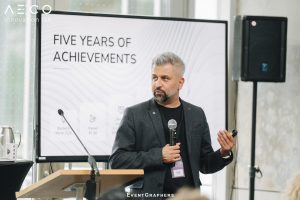Kimberly Gray has spent much of her career dealing with environmental concerns.
She’s chair of the civil and environmental engineering department at Northwestern University, in Evanston, Ill.
Since completing her doctoral work 40 years ago much of her teaching and research has dealt one way or another with problems of sustainability. In the last few years, however, she has shifted her focus.
“When it comes to sustainability, I think the train left the station,” she said in a recent interview. “We didn’t do it. So now I’m more concerned with resilience and adaptation.”
The interview was posted on the Science X Network.
In it, she said as a result of the shift she has spent much of her time recently thinking about how cities can better cope with a rapidly changing climate.
“There is nothing about the 20th century city — which North American cities so vividly exemplify — that is sustainable,” Gray says. “The city is not an adaptive system under rapidly changing climate circumstances.”
Nature, however, is an extremely adaptive system and Gray is working on strategies to help cities integrate nature into their infrastructure. She says only by embracing nature can cities provide vital services and deal with climate change.
“The U.S. is getting hit by extreme rain events with greater frequency,” she says, pointing to Hurricane Harvey in Houston last year and the continuing crisis in Puerto Rico following Hurricane Maria. “And what we see is that flooding carries with it a fair amount of ecological and economic damage in addition to health hazards.”
She says as extreme weather gets worse, innovative solutions are more urgent and more necessary than ever. But paradoxically, the problems we face with nature can be improved by relating to the natural world in new ways.
Gray says research shows marshes would have helped protect against the damage caused by Hurricane Sandy in 2012. These areas of low, treeless land are one of several forms of “green infrastructure” that could make cities more adaptive to a changing climate.
“A marsh is not damaged by floodwater,” she says. “It can very easily store floodwater. It adapts to extreme flooding and extreme dryness, without us having to do anything.”
The phrase “green infrastructure” has come into common use in recent years.
Such infrastructure uses nature to help manage water amid changing climate patterns in cities, where deteriorating pipes and undersize tunnels exacerbate flooding during extreme weather events.
Other green infrastructure projects may include natural grasses, prairie, streams and wetlands.
Gray says integrating networks of green infrastructure can help cities manage stormwater in an adaptive, sustainable way. The infrastructure could be as simple as patches of natural grasses along highways or weaving streams through neighbourhood yards. Networks of that sort she says would complement, not replace, the existing built infrastructure of underground pumps and pipes.
Gray’s research has shown the benefit of installing green infrastructure networks. She and a team of students worked with a Chicago suburb to determine the impact of installing rain gardens in homeowners’ yards.
These gardens work by holding some water back, thus slowing the flow into the storm sewer. She and her students found that installing rain gardens in just a few yards on a given city block will help that block better cope with periods of heavy rain.
The more gardens planted, the more flooding relief the residents will see.
Much of what Gray said in the interview is not news of course.
People have been talking about stormwater management for years.
But I thought her interview was well-timed, coming during a period when, for some, opposition to environmental concerns seems to have become a matter not of science but of political dogma.
Gray’s interview is a timely reminder that when it comes to dealing with Mother Nature, business as usual is not an option.
Korky Koroluk is an Ottawa-based freelance writer. Send comments to editor@dailycommercialnews.com.











Recent Comments